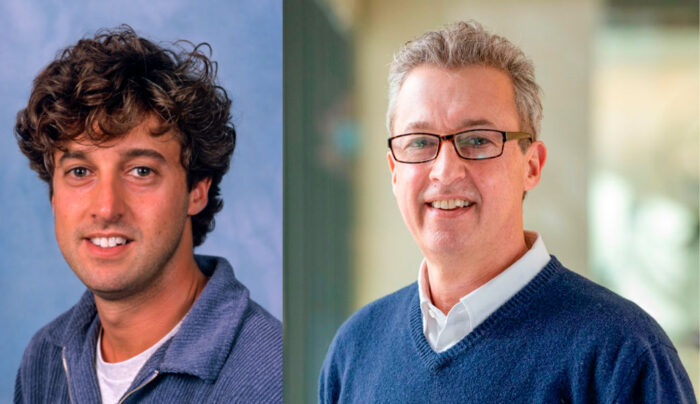Looking Back: Facundo D. Batista
Facundo was a Postdoctoral Researcher in the PNAC Division with Michael Neuberger, from 1996-2002. He is now Associate and Scientific Director, Ragon Institute of MGH, MIT and Harvard, and Professor of Microbiology and Immunology at Harvard. His lab studies the fundamental biology of the immune system to develop the next generation of vaccines and therapeutics.
For the 2022 LMB Alumni Newsletter, Facundo shares some memories from his time at the LMB.

I felt genuinely honored to be asked to contribute this series of recollections because my years at the LMB working with Michael Neuberger shaped who I am today. I first left Argentina to perform a PhD in Italy. However, César Milstein, one of the two Argentinian Nobelists in Physiology or Medicine, had always been an idol of mine, so moving to the UK to join the LMB was always my dream—one I was able to realize as a postdoc thanks to EMBO fellowships. LMB remained dreamlike once I was there: you would be having lunch and a Nobelist who felt larger than life, someone I, coming from a more hierarchical Argentinian system, could never imagine speaking to, would stop by to chat. It felt like being in a movie when Max Perutz would take his tea nearby and ask what I was up to. That open, egalitarian culture is something I have tried to build at the Ragon Institute, and I have learned in the process that such openness requires active and thoughtful effort. The culture at the LMB demonstrates that kind of ongoing engagement.
There were so many truly incredible people working there; I was almost overwhelmed by the choice and opportunity and was initially quite torn between César, Greg Winter, and Michael’s work. Ultimately joining Michael’s lab to study antigen presentation really shaped the course of my research interests and my own approach to mentorship; Michael was not just a deeply incisive thinker, but also someone who took a great deal of time with every trainee. When I joined his lab, my English was not exactly perfect; I will never forget the patient hours Michael put into preparing me for the Max Perutz Lecture.
That recalls a story from my early days there. I was used to washing my own Eppendorf tubes, so the LMB store, where I could request restriction enzymes or anything else and just give them my lab number, seemed like Wonderland to me. While such facilities are not quite so rare today, at the time it was pioneering, and I suspect the diversity of available supplies would still be hard to match. One day, though, I needed an x-ray cassette. I had some difficulty conveying this to the kind staff member at the desk, and ultimately, after much conversation, she reached into her desk drawer and pulled out correction fluid—or “tippex.” I was so flustered that I accepted it and fled to my lab, only returning for the cassette after two hours had passed. In a way, though, the tippex marks another thing I found at the LMB: no matter what research support you requested, including correction fluid, they would always do their best to provide.
The store is one mark of how LMB was and is structured to allow researchers to truly focus on science while the institution handles the rest. A rather more important aspect is core funding, which allows people there to ask profound questions rather than following current fads to stay on the publication and grant money treadmill. No one really understood at the time Richard Henderson’s fascination with the structure of bacteriorhodopsin, but he needed cryo-EM to answer his questions, and now, cryo-EM is used to answer everyone’s questions. You cannot do revolutionary science if you are chasing short-term funding cycles. Too many other institutions have lost sight of that.
A perhaps unintended aspect of LMB’s culture was how the physical environment fostered communication. I will be frank: the TC [tissue culture] room where I worked was not in great shape, but it was a shared challenge. I remember hours spent there, and despite the great green bloom of contamination every summer (as there was no aircon at the time, we would open the windows out of necessity), the long conversations I had working in TC were critical to my intellectual development. Communal research facilities ensured that the people I have learned are the true lifeblood of any institution—students, postdocs, young PIs—from every lab spent hours together talking about their science. I have had the opportunity to oversee the design of a new building for the Ragon Institute, which will be completed in 2024. It takes a very practical lesson from my time at the LMB: the TC rooms will be shared.
Facundo D. Batista, December 2022